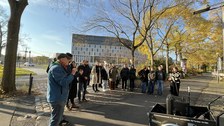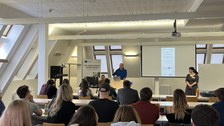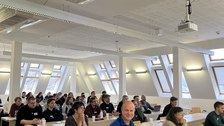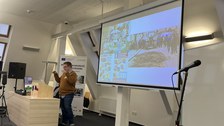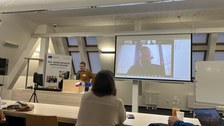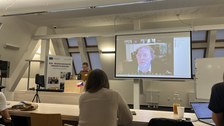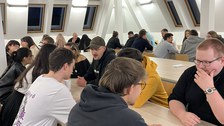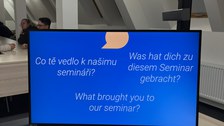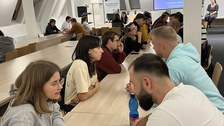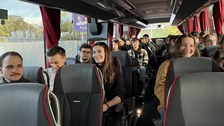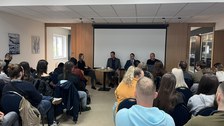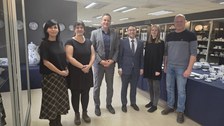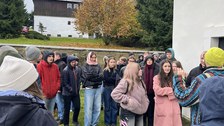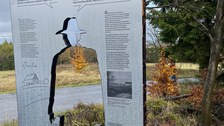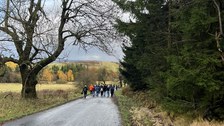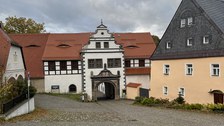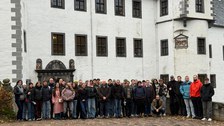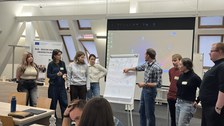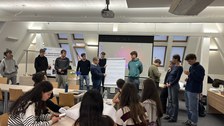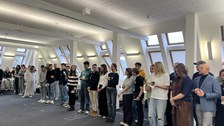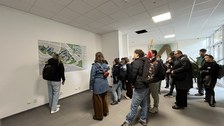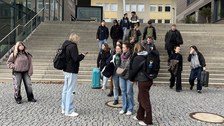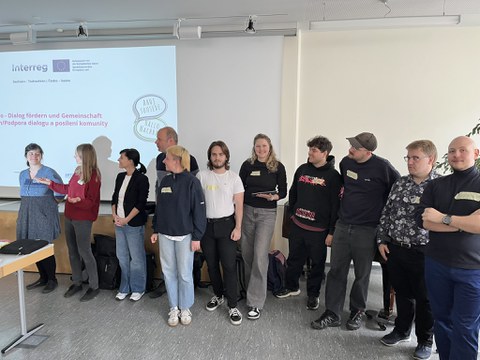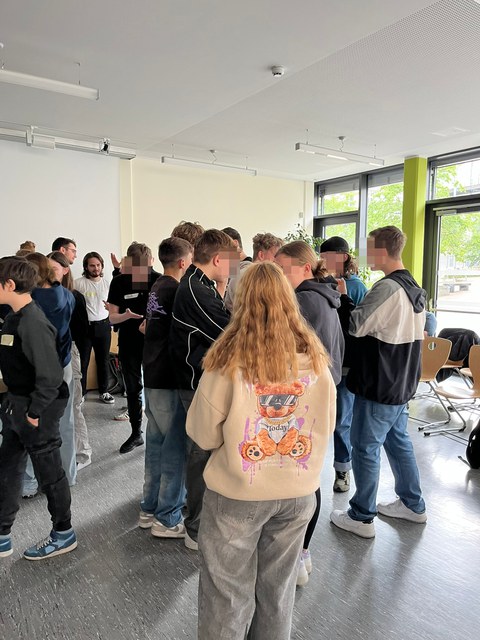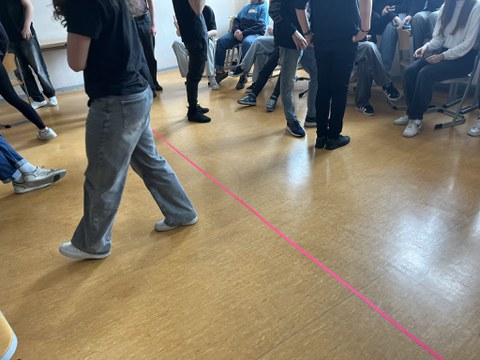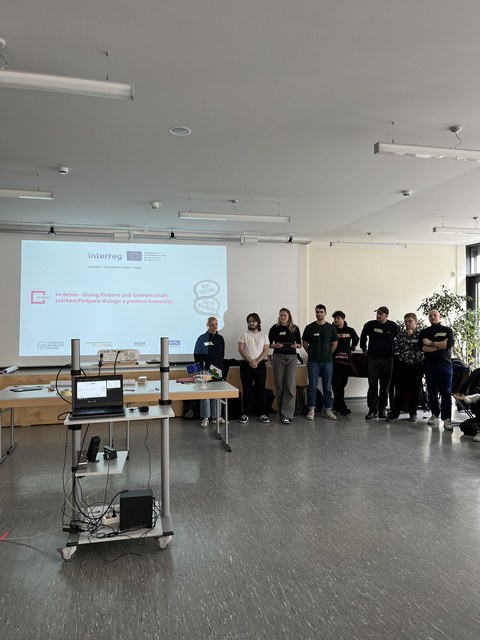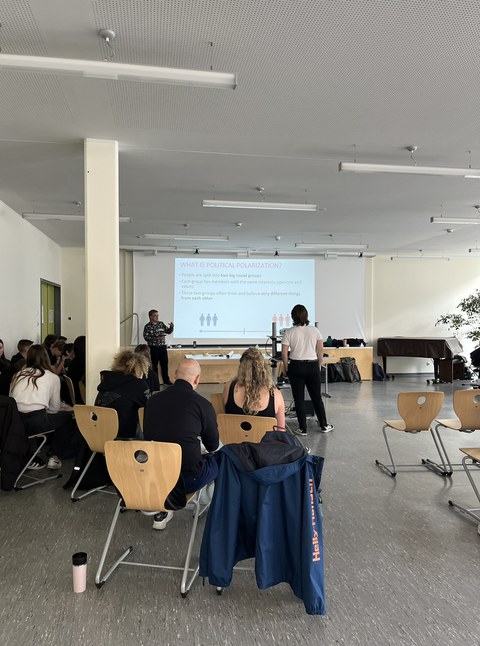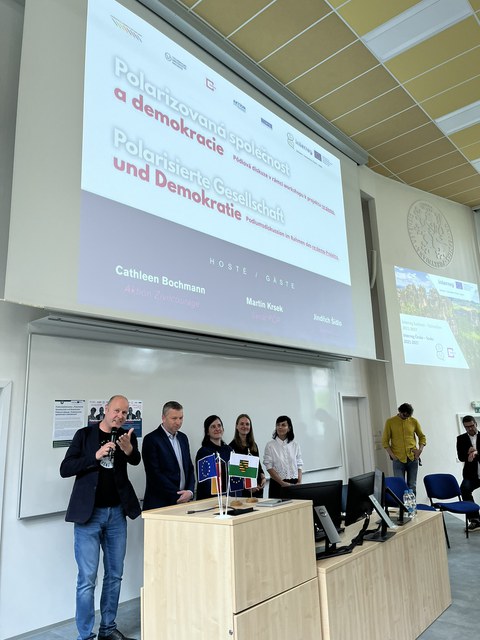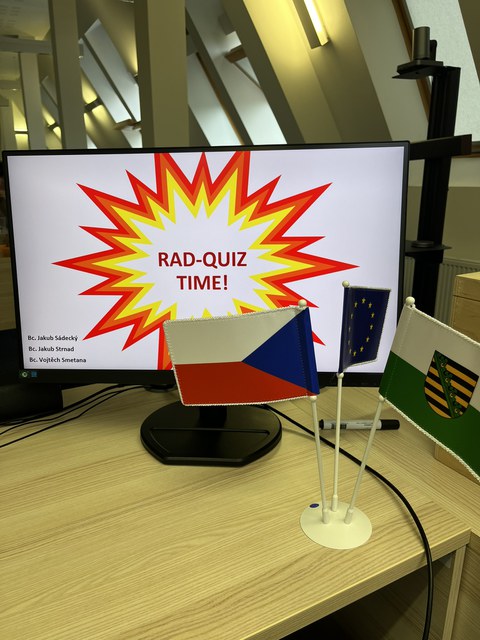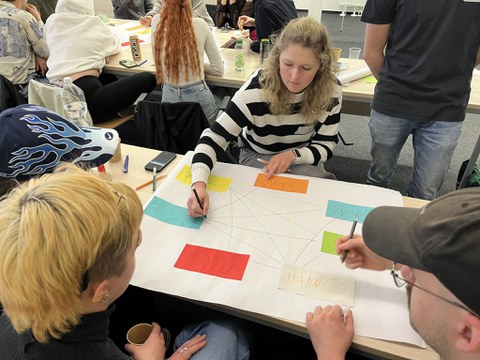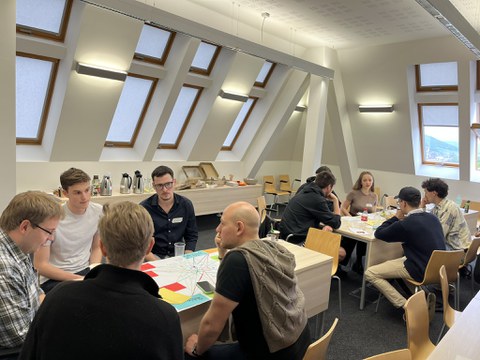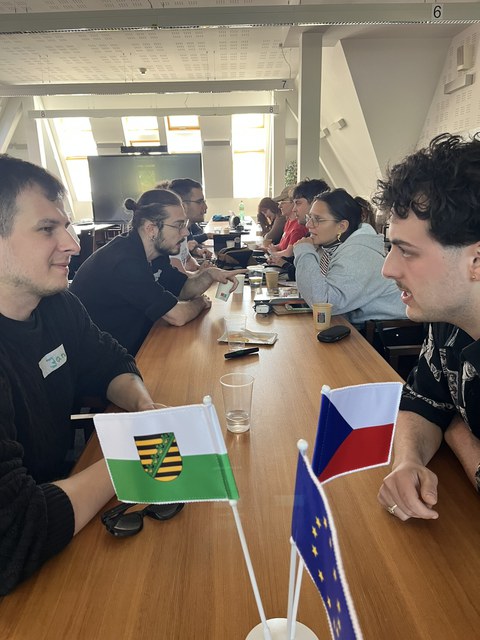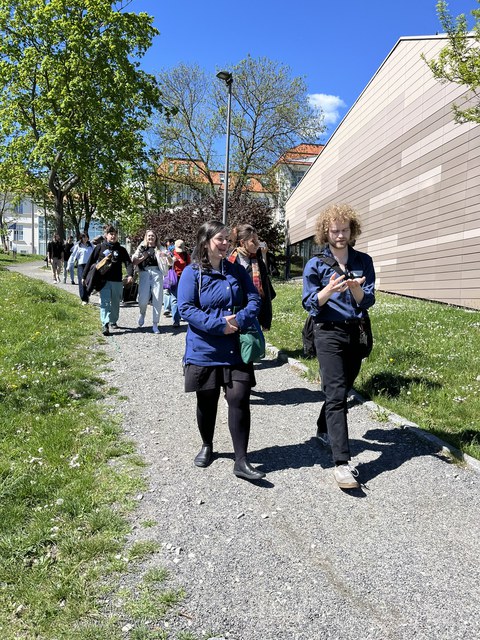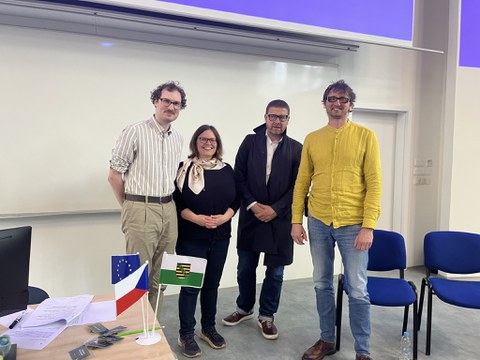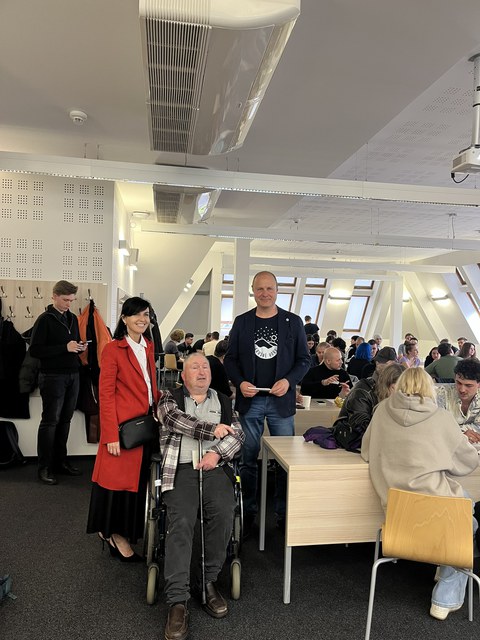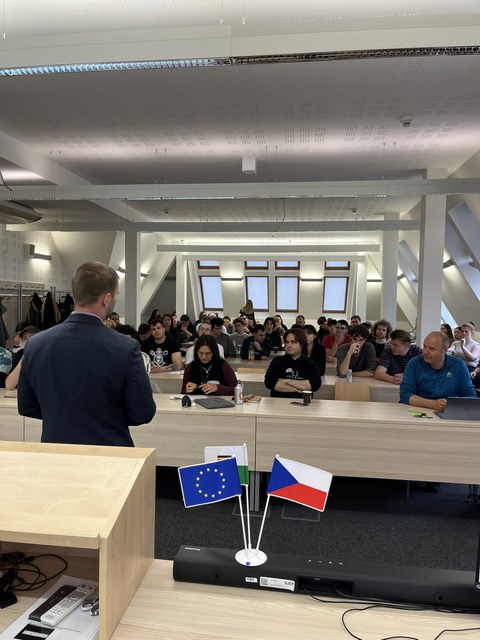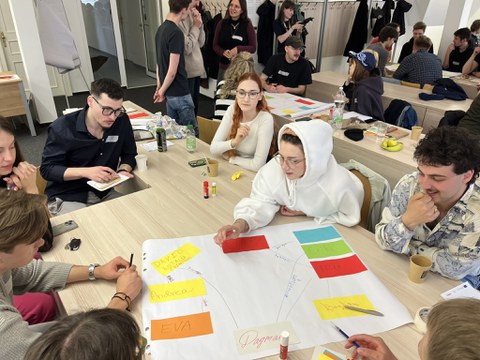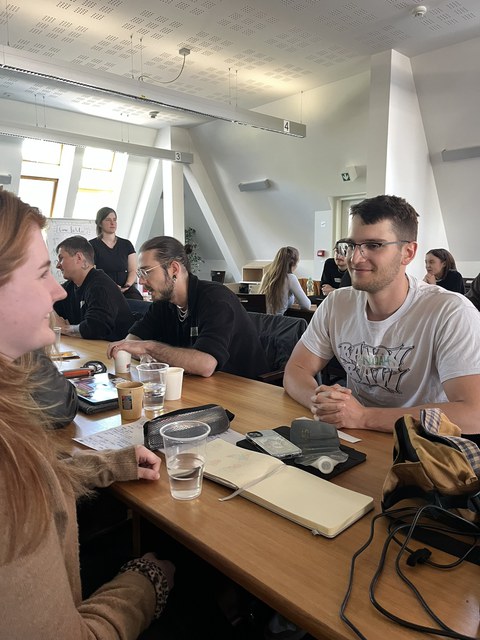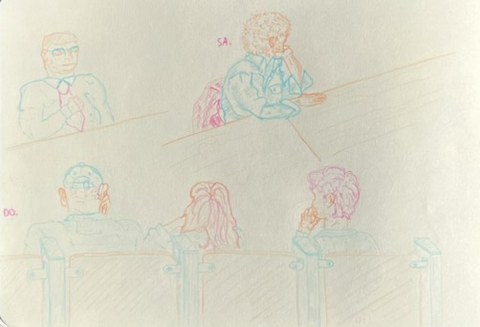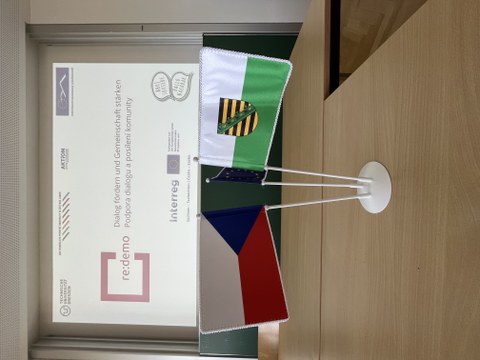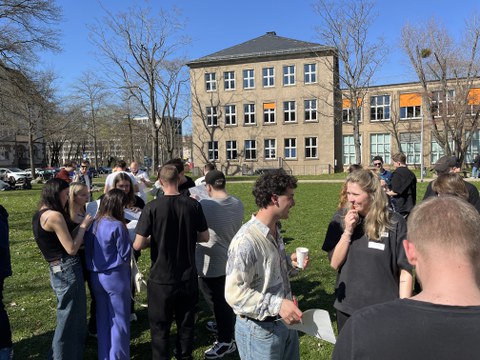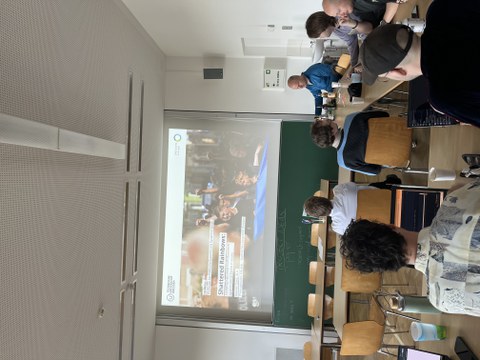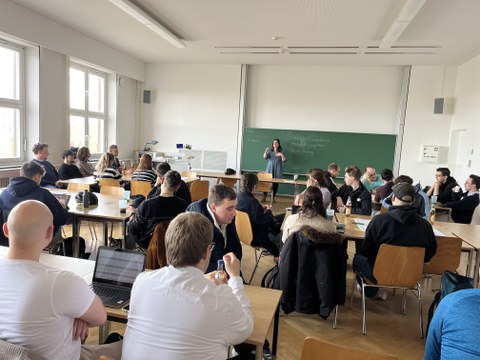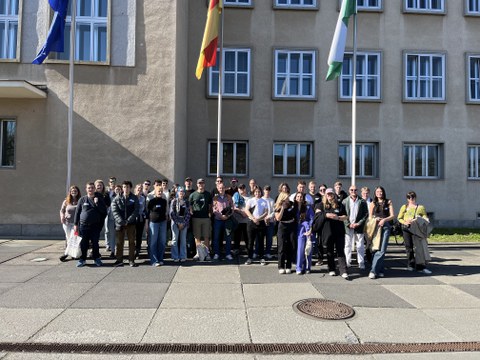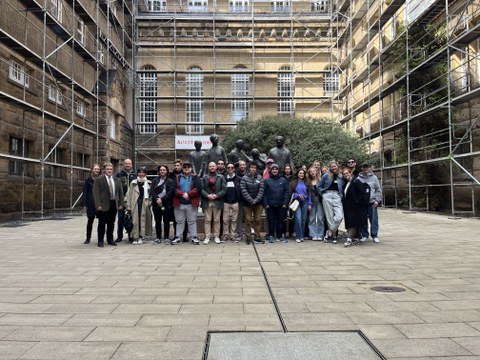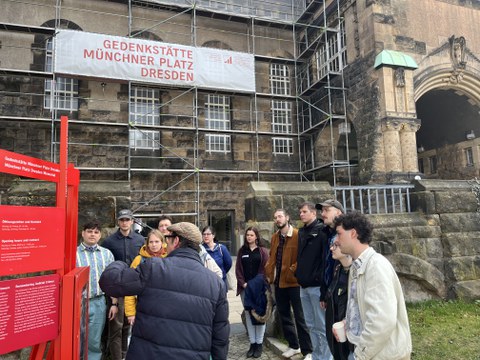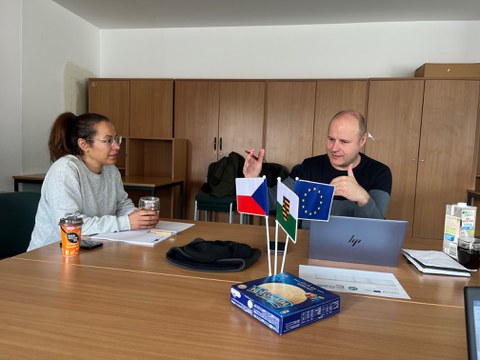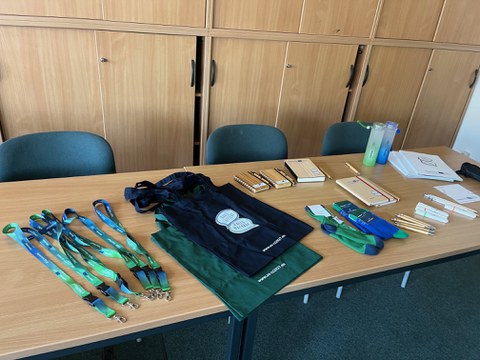Logbook
re:demo university workshop in Dresden Demografické dynamiky v pohraničí: Výzvy pro demokracii / Demographic dynamics in the border region: challenges for democracy
From November 6 to 8, 2025, the second workshop of the German-Czech cooperation seminar "Demographic Dynamics in the Border Region: Challenges for Democracy" took place in Dresden. The event was organized as part of the re:demo project and brought together Czech and German students to discuss social, political and demographic issues from an intercultural perspective.
The first day of the seminar began with a detailed tour of the Saxon State Parliament building. The students were guided through various areas of the building and gained an insight into the architectural features of the modern parliament building, which was deliberately designed to be transparent and open in order to make democratic processes visible. A highlight was the visit to the plenary chamber, where the workings of everyday parliamentary life were explained. The group was given an overview of the composition of the parliamentary groups represented in the state parliament and their seating arrangements. They were also given a clear explanation of how plenary sessions work - from the preparation of the agenda to the speaking and voting processes and the role of the President during debates.
Following the tour, the students met with MPs Albrecht Pallas (SPD) and Ingo Flemming (CDU). In this discussion, the politicians first reported on their everyday life in politics and the challenges associated with the office. They also discussed demographic change as a key political challenge. The MPs described how the Free State of Saxony is dealing with developments such as ageing, emigration and a shortage of skilled workers and which political measures and social initiatives are necessary to find sustainable solutions in the long term. For the students, this open exchange offered valuable insights into political decision-making processes and the complexity of social transformation processes. The evening ended with a joint dinner, which provided space for in-depth discussions.
The second day began with a themed tour of the city, led by the initiative "Mahngang Täter:innen-spuren". The tour focused on historical spaces of responsibility and issues of remembrance policy in Dresden. Central locations in the Old Town were examined from a critical perspective. The focus was on the fact that the baroque and touristically well-known squares are not only testimonies to the city's architecture, but also have a dark past: Many of these places were scenes of political staging, exclusion and violence during the National Socialist era. This historical context often fades into the background in today's view of the city or is deliberately ignored, which is why the tour made an important contribution to a critical examination of the city's culture of remembrance.
After lunch, the participants were given the opportunity to gain individual experience on the topic of demographic change with the help of an age suit. This practical element illustrated physical and sensory changes in old age and raised awareness of the challenges of an ageing society. The German-Czech groups continued to work intensively on their projects. The day ended with an intercultural evening at TU Dresden, which contributed to culinary and social networking.
Saturday started with a stimulating warm-up. The participants then positioned themselves on theses relating to the border region. The groups then continued their work. After lunch together, the groups presented their project progress. In the ensuing discussion, key findings on demographic developments in the Saxon-Czech border region, the impact on democratic participation and options for action for politics and society were identified. The group projects will now be continued and presented in digital gallery walks in December.
Overall, the seminar offered a successful combination of practical experience, intercultural cooperation and academic reflection. The varied formats, the encounters with political stakeholders and the cross-border composition of the group enabled a variety of perspectives on the question of how demographic dynamics challenge democratic structures - and at the same time open up new opportunities for collective action.

© Stefanie Gerstenberger

© Stefanie Gerstenberger

© Stefanie Gerstenberger

© Stefanie Gerstenberger

© Stefanie Gerstenberger

© Stefanie Gerstenberger

© Stefanie Gerstenberger

© Stefanie Gerstenberger

© Stefanie Gerstenberger

© Stefanie Gerstenberger

© Stefanie Gerstenberger
re:demo Univerzitní workshop v Drážďanech: Demografická dynamika v pohraničí: Výzvy pro demokracii / Demographic Dynamics in the Border Region: Challenges for Democracy
Od 6. do 8. listopadu 2025 se v Drážďanech konal druhý workshop německo-českého kooperačního semináře "Demografická dynamika v pohraničí: Výzvy pro demokracii". Akce, která byla organizována v rámci projektu re:demo, spojila české a německé studenty, aby diskutovali o sociálních, politických a demografických otázkách z interkulturní perspektivy.
První den semináře začal komplexní prohlídkou budovy Saského zemského sněmu. Studenti byli provedeni různými prostory a získali vhled do architektonických prvků moderní budovy parlamentu, která byla záměrně navržena tak, abyla byla transparentní a otevřená a zviditelnila tak demokratické procesy. Vrcholem byla návštěva plenárního sálu, kde bylo vysvětleno fungování každodenního parlamentního života. Studenti získali přehled o složení parlamentních skupin zastoupených v zemském sněmu a jejich uspořádání v zasedací místnosti. Dostali také jasné vysvětlení průběhu plenárních zasedání - od přípravy programu a procesů vystoupení a hlasování až po roli prezidenta během debat.
Po prohlídce se studenti setkali s poslanci Albrechtem Pallasem (SPD) a Ingem Flemmingem (CDU). V této diskusi politici nejprve hovořili o své každodenní práci v politice a o výzvách spojených s jejich úřadem. Poté diskutovali o demografických změnách coby klíčové politické výzvě. Poslanci popsali, jak Svobodný stát Sasko řeší vývojové trendy, jako je stárnoucí populace, emigrace a nedostatek kvalifikovaných pracovníků, a jaká politická opatření a sociální iniciativy jsou nezbytné k nalezení udržitelných dlouhodobých řešení. Pro studenty tato otevřená výměna názorů nabídla cenné poznatky o procesech politického rozhodování a složitosti společenských transformací. Den byl zakončen společnou večeří, která poskytla příležitost k dalším hloubkovým diskusím.
Druhý den začal tematickou prohlídkou města vedenou iniciativou "Mahngang Täter:innen-spuren" (Pamětní procházka: Stopy pachatelů). Prohlídka se zabývala historickými sférami odpovědnosti a otázkami politiky paměti v Drážďanech. Klíčová místa ve starém městě byla zkoumána z kritického hlediska. Důraz byl kladen na skutečnost, že barokní a turisticky oblíbená náměstí nejsou jen svědectvím o městské architektuře, ale mají také temnou minulost: mnohá z těchto míst byla během nacistické éry místem politických spektaklů, vyloučení a násilí. Tento historický kontext je v současných pohledech na město často přehlížen nebo záměrně ignorován, a proto prohlídka významně přispěla ke kritickému zkoumání kultury paměti ve městě.
Po obědě měli účastníci možnost na vlastní kůži zažít demografické změny pomocí obleku simulujícího stárnutí. Toto praktické cvičení ilustrovalo fyzické a smyslové změny, ke kterým dochází s věkem, a zvýšilo povědomí o výzvách stárnoucí společnosti. Německo-české skupiny poté pokračovaly v intenzivní projektové práci a hlouběji se ponořily do svých individuálních projektůů. Den byl zakončen mezikulturním večerem na Technické univerzitě v Drážďanech, který podpořil navazování kontaktů prostřednictvím kulinářské i společenské interakce.
Sobota začala stimulující rozcvičkou. Účastníci poté rozvinuli své postoje k tezím týkajícím se pohraničního regionu. Skupiny následně pokračovaly ve své práci. Po obědě skupiny prezentovaly průběh svých projektů. Následná diskuse zdůraznila klíčová zjištění týkající se demografických trendů v sasko-českém pohraničí, jejich dopadu na demokratickou participaci a potenciálních směrů činnosti pro politiku a společnost. Skupinové projekty budou nyní pokračovat a budou prezentovány v prosinci v rámci digitálních galerií.
Celkově seminář nabídl úspěšnou kombinaci praktických zkušeností, mezikulturní spolupráce a akademické reflexe. Rozmanité formáty, setkání s politickými aktéry a přeshraniční složení skupiny umožnily získat různé perspektivy na to, jak demografická dynamika ohrožuje demokratické struktury - a zároveň otevírá nové příležitosti pro kolektivní akci.
re:demo university workshop in Ústí nad Labem
Demografické dynamiky v pohraničí: Výzvy pro demokracii / Demographic dynamics in the border region: challenges for democracy
From October 23 to 25, 2025, the Univerzita Jana Evangelisty Purkyně v Ústí nad Labem (UJEP) hosted the kick-off workshop of the second joint seminar as part of the Saxon-Czech project "re:demo - Dialog fördern und Gemeinschaft stärken / Podpora dialogu a posílení komunity". The topic of the seminar was demographic changes in the border region and their effects on social cohesion and democracy.
On Thursday afternoon, the students from TUD Dresden University of Technology and UJEP were warmly welcomed to the Faculty of Arts, Humanities and Social Science at the Institute of Political Science. They got to know each other over coffee and pastries in an open and relaxed atmosphere. Afterwards, Master's students Jakub Sádecký and Vojtěch Smetana introduced the topic of "Rural Populism" in their lecture. The highlight of the first day was the panel discussion with doc. RNDr. Tomáš Kostelecký, CSc. (Sociological Institute of the Academy of Sciences of the Czech Republic, Prague) and Dr. Tim Leibert (Leibniz Institute for Regional Geography, Leipzig). Under the title "Who lives here and why is it important: Democracy in a changing border region", they discussed social, geographical and political dynamics in peripheral areas as well as the significance of demographic processes for democratic participation. The evening ended with a get-to-know-you speed dating session.
Friday took the group to the border region around Dubí and Zinnwald. Accompanied by Jan Kvapil, who explained the history and special features of the border region along the way, the day began with a visit to the Dům porcelánu s modrou krví (House of Porcelain with Blue Blood). There, the students discussed with the mayors Jiří Kašpar (Dubí) and Thomas Peters (Bad Gottleuba-Berggießhübel) the challenges of municipal politics in border regions - from demographic change and labor migration to economic transformation. Despite the windy autumn weather, the group then set off on a search for traces of German-Czech history in Cínovec/Zinnwald. In the afternoon, a visit to the Lauenstein Castle Museum in the Eastern Ore Mountains was on the agenda, where Gabriele Gelbrich and Jan Kvapil provided insights into life in the mountain regions and the historical links between the border regions.
Saturday was dedicated to the students' German-Czech project work. After a methodical experiment - "One step forward" - the students developed initial ideas for their joint research projects in small binational groups. The thematic approaches are diverse and promise exciting insights into the effects of demographic change on democratic processes and social participation. After a thematic city tour "On the traces of German-Czech relations in Ústí nad Labem", the seminar ended in the afternoon with a joint final round.
The meeting in Ústí nad Labem once again offered students from both universities the opportunity to discuss current social developments in the border region, compare perspectives and develop joint research questions. The next reunion will take place in Dresden at the beginning of November.

© Stefanie Gerstenberger
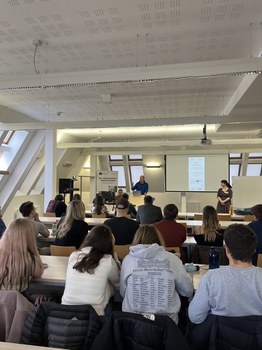
© Stefanie Gerstenberger
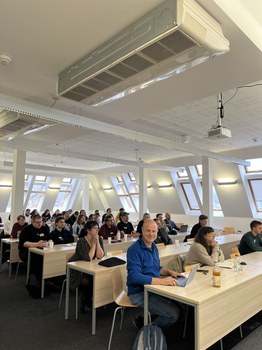
© Stefanie Gerstenberger
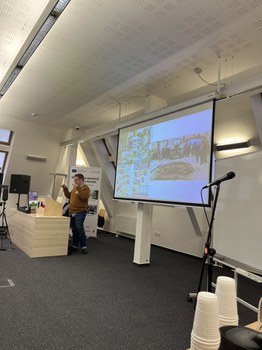
© Stefanie Gerstenberger
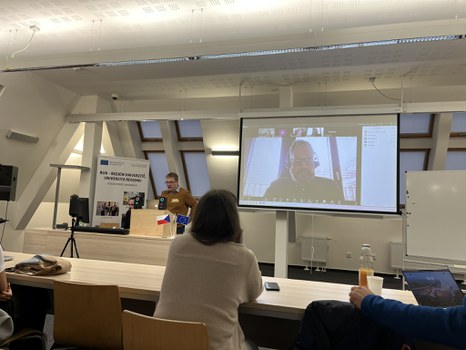
© Stefanie Gerstenberger
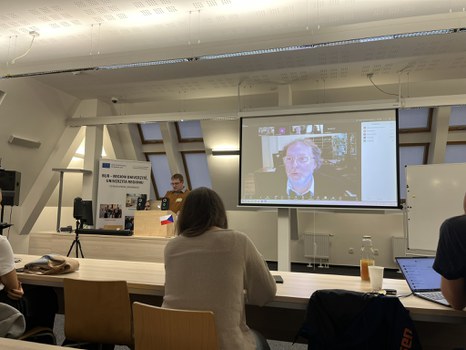
© Stefanie Gerstenberger
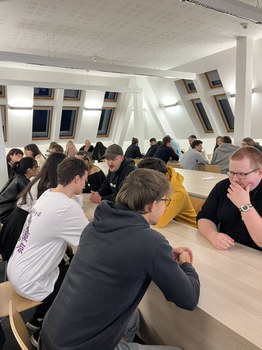
© Stefanie Gerstenberger
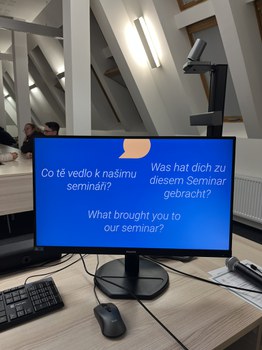
© Stefanie Gerstenberger
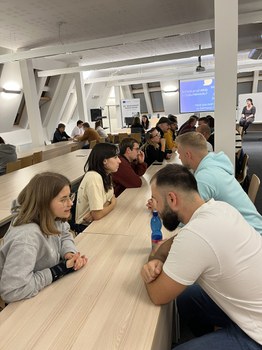
© Stefanie Gerstenberger
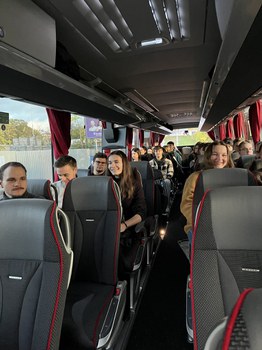
© Stefanie Gerstenberger
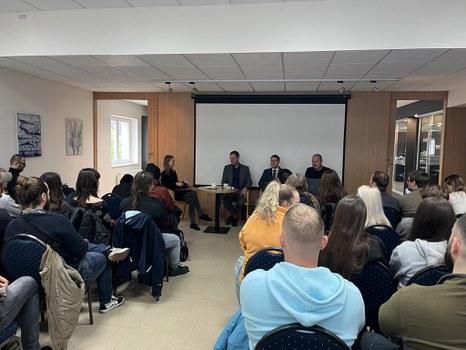
© Stefanie Gerstenberger

© Kristina Koudelková
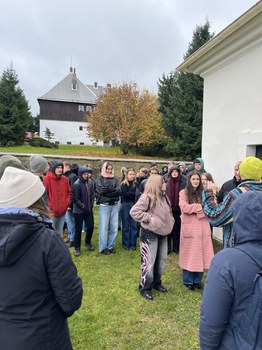
© Stefanie Gerstenberger
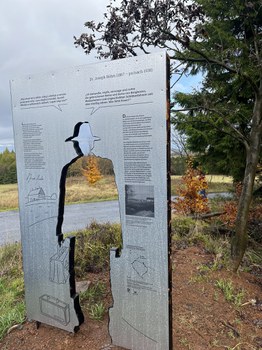
© Stefanie Gerstenberger
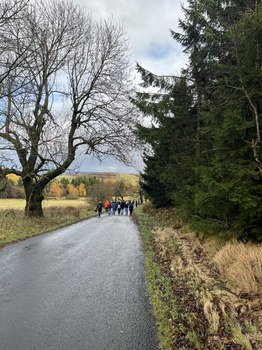
© Stefanie Gerstenberger
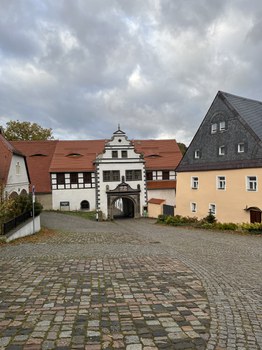
© Stefanie Gerstenberger
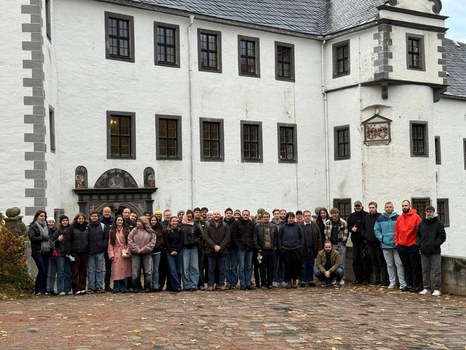
© Kristina Koudelková
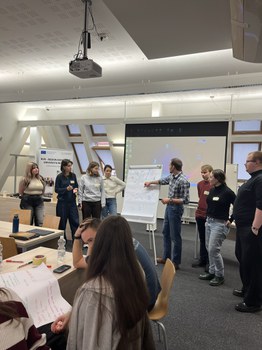
© Stefanie Gerstenberger
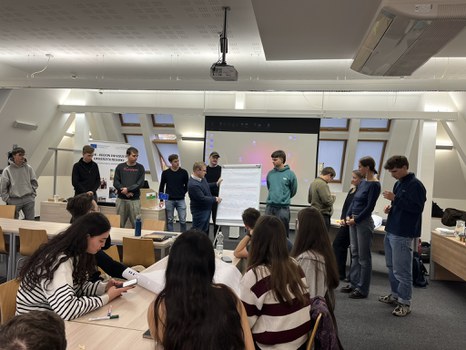
© Stefanie Gerstenberger
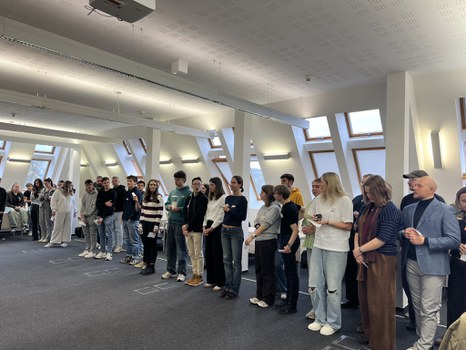
© Stefanie Gerstenberger
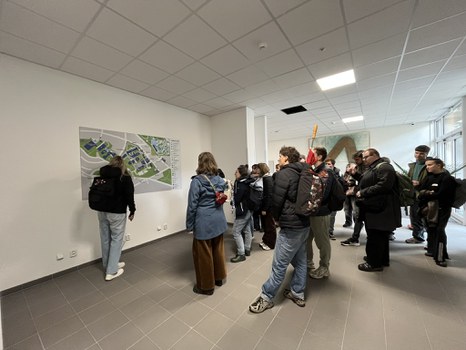
© Stefanie Gerstenberger
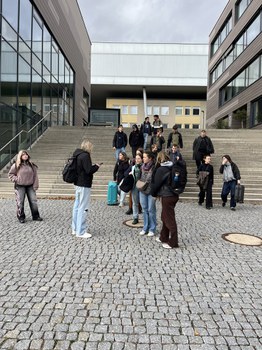
© Stefanie Gerstenberger
re:demo Univerzitní workshop v Ústí nad Labem
Demografické dynamiky v pohraničí: Výzvy pro demokracii / Demographic dynamics in the border region: challenges for democracy
Ve dnech 23-25. října 2025 se na Univerzitě Jana Evangelisty Purkyně v Ústí nad Labem (UJEP) uskutečnil úvodní workshop druhého společného semináře v rámci sasko-českého projektu "re:demo - Podpora dialogu a posílení komunity / Dialog fördern und Gemeinschaft stärken". Seminář se tematicky zaměřuje na demografické proměny v pohraničí a jejich dopady na soudržnost společnosti a fungování demokracie.
Ve čtvrtek odpoledne byli studenti Technické univerzity v Drážďanech a UJEP srdečně přivítáni na Filozofické fakultě, na Katedře politologie. Při kávě a malém občerstvení proběhlo první neformální seznámení v přátelské atmosféře. Následně studenti magisterského studia Jakub Sádecký a Vojtěch Smetana představili ve svém příspěvku téma "Rurální populismus". Odborným vrcholem prvního dne byla panelová diskuse s doc. RNDr. Tomášem Kosteleckým, CSc. (Sociologický ústav Akademie věd České republiky, Praha) a Dr. Timem Leibertem (Leibniz Institute for Regional Geography, Lipsko). Pod názvem "Kdo tu žije a proč na tom záleží: demokracie v proměňujícím se pohraničí" diskutovali o sociálních, geografických a politických dynamikách v periferních regionech a o významu demografických procesů pro demokratickou participaci. Večer zakončilo rychlé seznamovací "speed dating".
Páteční program zavedl skupinu do pohraniční oblasti kolem Dubí a Cínovce. Celodenní exkurzi doprovázel Jan Kvapil, který studentům přibližoval historii i specifika česko-německého pohraničí. Den začal návštěvou Domu porcelánu s modrou krví v Dubí, kde studenti diskutovali se starosty Jiřím Kašparem (Dubí) a Thomasem Petersem (Bad Gottleuba-Berggießhübel) o výzvách komunální politiky v pohraničí - od demografických změn přes pracovní migraci až po hospodářskou transformaci. Navzdory větrnému podzimnímu počasí se poté skupina vydala na pátrání po stopách česko-německé historie na Cínovci. Odpoledne následovala návštěva Muzea východního Krušnohoří na zámku Lauenstein, kde Gabriele Gelbrich a Jan Kvapil představili život v horských oblastech a historické propojení pohraničních regionů.
Sobota byla věnována česko-německé projektové práci studentů. Po metodickém experimentu "Krok dopředu" rozvíjeli studenti v binacionálních skupinách první návrhy svých společných výzkumných projektů. Tematické okruhy byly rozmanité a slibují zajímavé poznatky o dopadech demografických změn na demokratické procesy a společenskou soudržnost. Po tematické procházce "Po stopách česko-německých vztahů v Ústí nad Labem" seminář odpoledne zakončilo společné shrnutí a reflexe.
Setkání v Ústí nad Labem nabídlo studentům obou univerzit další příležitost sdílet zkušenosti, porovnat pohledy na aktuální společenský vývoj v pohraničí a rozvíjet společné výzkumné otázky. Na další setkání se účastníci mohou těšit již začátkem listopadu v Drážďanech.
School project day at the Adam Ries secondary school in Annaberg-Buchholz
On May 16, 2025, a bilateral project day took place at the Adam Ries secondary school in Annaberg-Buchholz as part of the German-Czech project re:demo - Dialog fördern und Gemeinschaft stärken / Podpora dialogu a posílení komunity. The project is being carried out in cooperation with the TUD Dresden University of Technology, the Univerzita J. E. Purkyně in Ústí nad Labem, Aktion Zivilcourage and the Erzgebirge-Krušnohoří Euroregion. This semester's focus is on the topics of polarization and radicalization.
The project day(program) at the secondary school was designed and carried out by students from TU Dresden and the Univerzita J. E. Purkyně in Ústí nad Labem. They were accompanied and professionally supported by Stefanie Gerstenberger (TU Dresden), Lukáš Novotný (UJEP Ústí nad Labem), Jana Wagner (Aktion Zivilcourage) and Petra Konečná (Euroregion Erzgebirge-Krušnohoří) - as well as by the teachers of the schools, who actively accompanied the project day.
The aim of the project day was to strengthen not only linguistic and intercultural understanding, but also social awareness and the social and democratic skills of the participants. On this day, around 40 pupils from Germany and the Czech Republic worked together on issues relating to diversity of opinion, conflict culture and social cohesion.
The project day began with a playful activity that gave the German and Czech pupils the opportunity to get to know each other and talk to each other. We started with an interactive exercise to mix up the groups and break down fears of contact: each person was given a card with a term - in German, Czech or English. The task was to find the other two participants in the room who had the same word in the other languages. The young people quickly made contact, helped each other with translations and exchanged initial words and impressions. The exercise created an open atmosphere and laid a good foundation for further joint work over the course of the day.
In subsequent discussion rounds, the focus was on communicative and social skills. The pupils learned how to enter into a dialog with different conversation partners in a short space of time, how to listen and respond to their counterparts. Intercultural exchange was at the heart of these rounds: the young people talked together about everyday experiences, but also about socially and politically relevant topics. The focus was not only on sharing their own thoughts, but also on being attentive to the other person, listening, asking questions and noticing similarities and differences. The aim was to promote openness, strengthen empathy and develop the courage to engage with new perspectives.
The central theme of the project day was polarization in society and politics and how to deal with different opinions. In order to approach this complex topic, the pupils were first given a brief theoretical introduction. Following on from this, several interactive workshops were held on this topic to help the young people understand the phenomenon of polarization and teach them how to deal with it.
In the position line game, the pupils dealt with polarizing statements and positioned themselves in the room - depending on whether they agreed or disagreed with a statement. The theses on which the young people took a stand ranged from more everyday to socially controversial topics. In the subsequent discussion with their classmates on the same or opposite side, they developed arguments, listened to each other and tried to understand different points of view.
The position line game was followed by an in-depth exercise in which the students grappled with a specific, thoroughly polarizing question: Should individuals restrict their own lifestyle in order to protect the environment? After first spontaneously expressing their opinion, the challenge was to take the opposite position in the next step - regardless of their own convictions. This reverse perspective challenged the young people to put themselves in other people's shoes and find arguments that may have seemed strange at first. It became clear how much personal experiences and values shape one's own opinion - and that points of view do not have to be fixed, but can change through exchange. The exercise strengthened the ability to critically question one's own perspective, to look at complex issues in a differentiated way and encouraged openness to new points of view.
At the end of the project day, the participants discussed how to deal with differences of opinion in everyday life in small groups. It became clear how crucial skills such as tolerance, communication skills and empathy are in dealing with the diversity of attitudes and beliefs in our society. The results were recorded and reflected on together.
The project day was characterized by an open, respectful atmosphere and showed how much potential lies in the cooperation of young people from different linguistic and cultural contexts. The pupils expanded their vocabulary and gained an insight into other perspectives and ways of thinking by exchanging ideas with each other. Over the course of the day, new contacts were made, mutual understanding improved - and the experience was gained that cooperation can also work well across language barriers.
Školní projektový den na Gymnáziu Adama Riese v Annaberg-Buchholz
Dne 16. května 2025 se na Gymnáziu Adama Riese v Annaberg-Buchholz uskutečnil bilaterální projektový den v rámci česko-německého projektu re:demo - Podpora dialogu a posílení komunity. Projekt je realizován ve spolupráci s Technickou univerzitou v Drážďanech (TUD), Univerzitou J. E. Purkyně v Ústí nad Labem (UJEP), Aktion Zivilcourage a Euroregionem Krušnohoří. V tomto semestru se zaměřuje na témata polarizace a radikalizace.
Projektový den(program) na gymnáziu navrhli a realizovali studenti z TUD a UJEP. Doprovod a odbornou asistenci jim poskytli Stefanie Gerstenberger (TUD), Lukáš Novotný (UJEP), Jana Wagner (Aktion Zivilcourage), Petra Konečná (Euroregion Krušnohoří) i učitelé školy, kteří projektový den aktivně podpořili.
Cílem projektového dne bylo nejen zlepšit jazykové a mezikulturní porozumění, ale také posílit povědomí účastníků o společnosti a jejich sociální a demokratické dovednosti. Přibližně 40 žáků z Německa a České republiky společně pracovalo na tématech týkajících se rozmanitosti názorů, kultury konfliktů a sociální soudržnosti.
Projektový den začal následujícím interaktivním cvičením, které mělo za cíl promíchat skupiny a dalo tak německým a českým žákům příležitost se navzájem poznat a zapojit se do konverzace: každý dostal kartičku s jedním slovem - v němčině, češtině nebo angličtině. Úkolem bylo najít v místnosti další dva účastníky, kteří měli stejné slovo ve zbylých jazycích. Žáci se rychle spojili, vzájemně se podporovali v překladu a vyměňovali si první slova a dojmy. Cvičení vytvořilo otevřenou atmosféru a položilo pevný základ pro další spolupráci v průběhu celého dne.
Následná diskusní kola se zaměřila na komunikaci a sociální dovednosti. Žáci se v krátkém čase naučili vést dialog s různými komunikačními partnery, naslouchat a reagovat. Zaměření těěchto kol bylo primárně na mezikulturní výměnu: žáci společně diskutovali o každodenních zkušenostech i o společensky a politicky relevantních tématech. Důraz byl kladen nejen na sdílení vlastních myšlenek, ale také na pozorné zapojení partnera v rozhovoru, naslouchání, pokládání otázek a rozpoznávání podobností i rozdílů. Cílem bylo podpořit otevřenost, posílit empatii a rozvinout odvahu přijmout nové perspektivy.
Ústředním tématem projektového dne byla polarizace ve společnosti a politice a otázka, jak se vypořádat s odlišnými názory. Aby se žáci k tomuto složitému tématu přiblížili, obdrželi nejprve krátký teoretický úvod. Následně se konalo několik interaktivních workshopů na toto téma, které měly žákům pomoci pochopit fenomén polarizace a naučit je, jak se s ním vypořádat.
V pohybové poziční hře účastníci zkoumali polarizující tvrzení a v závislosti na tom, zda s nimi souhlasili, či nesouhlasili, zaujímali v místnosti vlastní pozice. Tvrzení tematicky sahala od každodenních až po společensky kontroverzní témata. V následné diskusi se spolužáky na domácí nebo zahraniční straně účastníci rozvíjeli argumenty, vzájemně si naslouchali a snažili se pochopit různé perspektivy.
Poté následovalo cvičení, ve kterém se žáci zabývali konkrétní, silně polarizující otázkou: Měli by jednotlivci omezit svůj životní styl, aby chránili životní prostředí? Po spontánním vyjádření svých názorů byli požádáni o zaujetí opačného postoje - bez ohledu na vlastní přesvědčení. Tato obrácená perspektiva vyzvala žáky, aby se vcítili do situace ostatních a našli argumenty, které by se jim zpočátku mohly zdát zvláštní. Cvičení zdůraznilo, do jaké míry osobní zkušenosti a hodnoty formují vlastní názory - a že názory nemusí být fixní, ale mohou se měnit diskusí. Zároveň posílilo schopnost kritického pohledu na vlastní perspektivu, zaujetí diferencovaného pohledu na složité problémy a otevřenost vůči novým perspektivám.
Na konci projektového dne účastníci v malých skupinách diskutovali o tom, jak se vypořádat s neshodami v každodenním životě. To ukázalo, jak zásadní jsou tolerance, komunikační dovednosti a empatie pro zvládání rozmanitosti postojů a přesvědčení v naší společnosti. Výsledky byly zaznamenány a společně reflektovány.
Projektový den, který provázela otevřená a respektující atmosféra, ukázal velký potenciál spolupráce mladých lidí z různých jazykových a kulturních prostředí. Žáci si rozšířili slovní zásobu a prostřednictvím vzájemné výměny názorů získali vhled do jiných perspektiv a způsobů myšlení. V průběhu dne se podařilo navázat nové kontakty, rozvinout lepší vzájemné porozumění a získat zkušenost, že spolupráce může dobře fungovat i přes jazykové bariéry.
Universitätsworkshop 24.04.-26.04.2025
Following the successful kick-off workshop in Dresden, the German-Czech project "re:demo: Promoting dialogue and strengthening community / Podpora dialogu a posílení komunity" continued its seminar on the topic of "Strengthening community, living diversity: Together against polarization and radicalization" from 24 to 26 April 2025 in Ústí nad Labem(programme). The aim of the meeting was to continue the debate on radicalization and social resilience and to further deepen the German-Czech exchange.
After the arrival of the German students in Ústí nad Labem, the seminar started on Thursday at 15:00 with a warm welcome by the Rector of the UJEP Jaroslav Koutský and the project team, represented by Lukáš Novotný (UJEP), Stefanie Gerstenberger (TU Dresden), Jana Wagner (Aktion Zvilcourage) and Petra Konečná (Euroregion Erzgebirge-Krušnohoří).
Afterwards, Cathleen Bochmann (Aktion Zivilcourage), Martin Krsek (Senate PČR) and Jindřich Šídlo (Seznam.cz) discussed the topic of "Polarized society and democracy" as part of a panel discussion. The moderator was Jakub Strnad (student FF UJEP). The discussion focused on events in Germany and the Czech Republic that have contributed significantly to social polarization in recent years. Particular emphasis was placed on the influence of polarizing parties, their strategies and the different strength of their impact in the two countries. The role and characteristics of right-wing extremism were also examined in detail. The discussion made it impressively clear that polarization not only puts political institutions under pressure, but also places a considerable burden on social coexistence. A particular focus was therefore placed on the question of how social resilience can be strengthened in order to preserve democratic values and social cohesion even in times of increasing division.
A short coffee break was followed by a quiz organized by Master's students on the topics of democracy and radicalism, which provided an interactive and instructive conclusion to the first day.
Friday began with an exciting presentation by Pavel Gazárek (ČVUT / Police ČR) on deradicalization programs as a contribution to a resilient society. His practical experience provided an important insight into prevention strategies.
The day was also characterized by integrative workshops and intensive group work, which were designed and led by Stefanie Gerstenberger (TU Dresden) and Jana Wagner (Aktion Zivilcourage). In the morning, the participants came together in mixed German-Czech groups to discuss what they had in common, get to know each other better and talk to each other.
This was followed by a presentation by Paritätische Freiwilligendienste Sachsen gGmbH, which provided information about the opportunities to complete a voluntary service in Germany or the Czech Republic. This gave the participants a further perspective for a long-term German-Czech exchange.
After a lunch break, the participants engaged in dilemma discussions on controversial social issues. The focus was on the debate surrounding the poem "Avenidas" by Eugen Gomringer on the façade of the Alice Salomon University of Applied Sciences in Berlin and the question of the appropriate use of racist terms in children's books, such as those found in Astrid Lindgren's Pippi Longstocking. The discussions enabled the participants to take on different perspectives and reflect on language sensitivity, cultural heritage and social change.
Afterwards, the students continued to work on their joint projects, which are created as part of the seminar. The day ended with a barbecue together.
On Saturday morning, Jakub Sádecký and Vojtěch Smetana (both UJEP students) gave a lecture on the polarization of societies in Central Europe.
This was followed by an argumentative "speed dating" in which the participants were asked to formulate their positions on polarizing socio-political issues quickly and precisely and defend them in a short exchange. The aim of the method was to strengthen the ability to engage with the other person's arguments, to clearly defend one's own points of view and at the same time to practice tolerance towards dissenting opinions.
After a further group work phase and a shared lunch, the content part of the seminar came to an end. This was followed by a themed tour of Ústí nad Labem, which focused on German-Czech relations.
The follow-up seminar in Ústí nad Labem was a successful continuation of the project. It offered exciting impulses and practice-oriented methods and brought students from Germany and the Czech Republic closer together. The varied mix of expert lectures, workshops and joint activities promoted intercultural exchange and helped to reflect on polarization and radicalization tendencies in German and Czech society. At the same time, concrete approaches were reflected on how social diversity can be strengthened and a lively coexistence promoted.
Univerzitní workshop 24-26 dubna 2025
Po úspěšném úvodním workshopu v Drážďanech pokračoval německo-český projekt "re:demo: Podpora dialogu a posílení komunity / Dialog fördern und Gemeinschaft stärken" druhým workshopem na téma "Posilování komunity, živá rozmanitost: Společně proti polarizaci a radikalizaci" od 24. do 26. dubna 2025 v Ústí nad Labem(program). Jeho cílem bylo navázat na diskusi o radikalizaci a sociální odolnosti a dále prohloubit německo-českou výměnu.
Workshop začal po příjezdu německých studentů do Ústí nad Labem ve čtvrtek v 15:00 za přijetí rektora UJEP Jaroslava Koutského a projektového týmu zastoupeného Lukášem Novotným (UJEP), Stefanie Gerstenberger (TU Dresden), Janou Wagner (Aktion Zvilcourage) a Petrou Konečnou (Euroregion Erzgebirge-Krušnohoří).
Následovala panelová diskuze na téma "Polarizovaná společnost a demokracie" v moderaci studenta FF UJEP, Jakuba Strnada, jejímiž hosty byli Cathleen Bochmann (Aktion Zivilcourage), Martin Krsek (Senát PČR) a Jindřich Šídlo (Seznam.cz). Diskuse se zaměřila na události v Německu a České republice, které v posledních letech významně přispěly k sociální polarizaci. Zvláštní důraz byl kladen na vliv polarizujících stran, jejich strategie a různou míru jejich dopadu v obou zemích. Podrobně byla debatována také role a povaha pravicového extremismu. Diskuse ukázala, že polarizace vytváří nejen tlak na politické instituce, ale přináší i značnou zátěž pro sociální soužití. Zvláštní pozornost proto byla věnována otázce, jak posílit sociální odolnost, aby zůstaly zachovány demokratické hodnoty a sociální soudržnost i v dobách rostoucího rozdělení.
Po krátké přestávce na kávu uzavřel první den workshopu interaktivní a vzdělávací kvíz na téma demokracie a radikalismu, který uspořádali studenti magisterského studia.
Pátek začal poutavou přednáškou Pavla Gazárka (ČVUT / Policie ČR) o deradikalizačních programech jako příspěvku k odolné společnosti. Jeho zkušenosti poskytly zajímavý praktický vhled do preventivních strategií.
Po přednášce pokračoval program integrativními aktivitami a intenzivní skupinovou prací, které navrhly a vedly Stefanie Gerstenberger (TU Dresden) a Jana Wagner (Aktion Zivilcourage). Dopoledne si účastníci vyměňovali názory ve smíšených německo-českých skupinách, aby se lépe poznali a navázali konverzaci.
Následovala prezentace Paritätische Freiwilligendienste Sachsen gGmbH, která informovala o možnostech absolvování dobrovolnické služby v Německu nebo v České republice. To účastníkům ukázalo další perspektivu pro dlouhodobou německo-českou výměnu.
Po obědě se účastníci zapojili do diskusí o kontroverzních společenských otázkách. Důraz byl kladen jednak na debatu o básni "Avenidas" od Eugena Gomringera na fasádě Univerzity Alice Salomonové v Berlíně a jednak na otázku vhodného používání rasistických výrazů v dětských knihách, jako jsou ty, které se nachází v knize Pipi Dlouhá Punčocha od Astrid Lindgrenové. Diskuse umožnily účastníkům zaujmout různé postoje a zamyslet se nad jazykovou citlivostí, kulturním dědictvím a společenskými změnami.
Poté studenti pokračovali v práci na svém společném projektu, který vzniká v rámci workshopu. Den zakončila společná grilovačka.
V sobotu dopoledne vystoupili Jakub Sádecký a Vojtěch Smetana (oba studenti FF UJEP) s přednáškou o polarizaci společností ve střední Evropě.
Následoval argumentační "speed dating", v jehož rámci měli účastníci rychle a přesně formulovat své postoje k polarizujícím sociopolitickým otázkám a obhájit je v krátké výměně názorů. Cílem metody bylo posílit schopnost zaujmout svými argumenty druhou osobu, jasně reprezentovat vlastní úhel pohledu a zároveň procvičit toleranci vůči odlišným názorům. Po další fázi skupinové práce a společném obědě byla obsahová část workshopu ukončena. Účastníci pokračovali na tematickou prohlídku města Ústí nad Labem, která se orientovala na místní historické německo-české vztahy.
Workshop v Ústí nad Labem byl úspěšným pokračováním projektu. Prakticky orientované metody a sblížily studenty z Německa a České republiky. Kombinace odborných přednášek, workshopů a společných aktivit podpořila mezikulturní výměnu a pomohla zamyslet se nad polarizačními a radikalizačními tendencemi v německé a české společnosti. Zároveň byly zváženy konkrétní přístupy k posílení sociální rozmanitosti a podpoře živého soužití.
Universitätsworkshop 04.04.-06.04.2025
re:demo University workshop Strengthening community, living diversity: Zusammen gegen Radikalisierung und Polarisierung / Posilování komunitního života, živá rozmanitost: Společně proti radikalizaci a polarizaci
As part of the Saxon-Czech project "re:demo: Promoting Dialogue and Strengthening Community/ Podpora dialogu a posílení komunity", the first joint face-to-face seminar(program) with students from the Univerzita Jana Evangelisty Purkyně Ústí nad Labem and the TUD Dresden University of Technology took place in Dresden from 4 to 6 April 2025. The overarching theme of this semester is to deal with the topics of polarization, radicalization and social resilience in Saxony and the Czech Republic across borders.
On Friday, the students were warmly welcomed to TU Dresden by Stefanie Gerstenberger (TU Dresden), Lukáš Novotný (UJEP), Jana Wagner (Aktion Zivilcourage) and Petra Konečná (Euroregion Erzgebirge-Krušnohoří). In a relaxed atmosphere - over coffee and cookies - interactive games provided an initial opportunity to get to know each other and created a good atmosphere among the participants. The students then made their way to the Saxon State Parliament. During the streetcar ride, discussion cards were used to stimulate initial discussions. In the Saxon state parliament, the group met with members of parliament Albrecht Pallas (SPD) and Ingo Flemming (CDU) to discuss the most pressing political and social issues in Saxony. The focus was on the noticeable dissatisfaction of large sections of the population, the growing influence of populist forces and the question of how democracy can be strengthened in an increasingly polarized environment. The day ended with a joint dinner.
Saturday began with an in-depth introduction to the topics of polarization, radicalization and social resilience in the Czech Republic and Germany. Building on this, small groups discussed how these phenomena can be countered and how social tensions can be endured and dealt with constructively. The participants then developed initial ideas for their project work, which will be developed as part of the seminar. In the afternoon, the group visited the Münchner Platz memorial site. The group was given an insight into the history of the Georg Schumann Building and the crimes committed there during National Socialism and the GDR dictatorship. The day ended with a lecture by Bastian Stock on right-wing extremist youth movements against LGBTQ+ events in Saxony.
On Sunday, the seminar started with an exercise to strengthen resilience. The students then continued to work in small groups on their project ideas, which they later presented and discussed. The seminar ended with a joint conclusion.
The seminar offered an intensive exchange on current political challenges as well as a platform for networking and developing joint projects. We are looking forward to the continuation of the seminar and are looking forward to seeing our Czech fellow students again in Ústí nad Labem in April.
re:demo Univerzitní workshop Posilování komunitního života, živá rozmanitost: Společně proti radikalizaci a polarizaci / Strengthening community, living diversity: Together against radicalization and polarization (4. - 6. dubna 2025)
V rámci sasko-českého projektu "re:demo: Podpora dialogu a posilování komunity" se ve dnech 4. až 6. dubna 2025 v Drážďanech uskutečnil první společný seminář(program) se studenty Univerzity Jana Evangelisty Purkyně Ústí nad Labem a Vysoké školy technické v Drážďanech. Zastřešujícím tématem tohoto semestru je řešení problémů radikalizace a sociální radikalizace v Sasku a České republice.
V pátek studenty na TU Dresden přivítali Stefanie Gerstenberger (TU Dresden), Lukáš Novotný (UJEP), Jana Wagner (Aktion Civil Courage) a Petra Konečná (Euroregion Erzgebirge-Krušnohoří). V uvolněné atmosféře - s kávou a sušenkami - nabídly interaktivní seznamovací hry počáteční příležitost k výměně názorů a vytvořily mezi účastníky dobrou náladu. Poté studenti navštívili saský zemský parlament. Během jízdy tramvají byla podněcována diskuze prostřednictvím diskusních karet. V saském zemském parlamentu se skupina setkala s poslanci zemského parlamentu Albrechtem Pallasem (SPD) a Ingo Flemmingem (CDU), aby projednali palčivé politické a sociální otázky v Sasku. V centru pozornosti byla nespokojenost značných vrstev obyvatelstva, rostoucí vliv populistických sil a otázka, jak lze posílit demokracii v tomto stále více polarizovaném prostředí. Den byl zakončen společnou večeří.
Sobota začala úvodem do témat polarizace, radikalizace a sociální odolnosti v České republice a Německu. V návaznosti na to diskutovali studenti ve skupinkách o tom, jak lze tyto jevy řešit a jak lze vydržet sociální napětí a konstruktivně se s ním vypořádat. Poté účastníci vypracovali prvotní nápady pro svou projektovou práci. Odpoledne skupina navštívila památník Münchner Platz. Skupina získala vhled do historie budovy Georga Schumanna a zločinů spáchaných v ní během nacionálního socialismu a diktatury NDR. Den zakončila přednáška Bastiana Stocka o pravicově extremistických hnutích mládeže proti LGBTQ+ událostem v Sasku.
V neděli seminář začal cvičením na posílení odolnosti. Students can practise on small groups of students on projects in the classroom, which will be presented and discussed. Seminář nabídl intenzivní výměnu názorů na aktuální politické výzvy a také platformu pro vytváření sítí a rozvoj společných projektůů. Těšíme se na pokračování semináře a na naše nové přátele v dubnu v Ústí nad Labem.
Kick-off 04.03.2025
On March 4th we met for our project kick-off at the TU Dresden. In addition to organizational arrangements, we started with the intensive planning of the content of the first university workshop, which will take place from 04 April to 06 April at TU Dresden.
Dne 4. března jsme se sešli na zahájení projektu na Technické univerzitě v Drážďanech. Kromě organizačních příprav jsme začali intenzivně plánovat obsah prvního univerzitního workshopu, který se bude konat na TU Dresden od 4. do 6. dubna.






